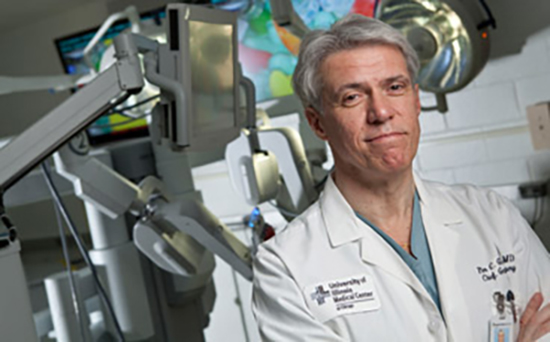About us Heading link
The Department of Surgery at the University of Illinois College of Medicine stands as a dynamic and pioneering institution dedicated to surgical education, patient care, and research. Celebrating its 75th Anniversary in 2012, the department has a rich legacy of excellence. It is home to a distinguished faculty of accomplished surgeons who are leaders in their respective fields. Focused on innovation and cutting-edge technologies, the Department of Surgery provides a comprehensive training environment for medical students, residents, and fellows. The commitment to advancing surgical knowledge is evident through impactful research endeavors and a dedication to delivering high-quality patient care. Through a combination of clinical expertise and a commitment to medical education, the Department of Surgery at UI College of Medicine continues to make significant contributions to the ever-evolving landscape of surgical medicine.
Our History Heading link
-
Warren Henry Cole (Department Head 1936 – 1966)
Warren Henry Cole was born in 1898 in Clay center, Kansas, and spent his boyhood days on his parents’ farm. His mother’s death due to complications from surgery launched Cole into a career in medicine that was distinguished by his dedication to teaching and research to improve the surgical care of patients. Cole received his MD from Washington University School of Medicine in 1920 and completed his internship and surgical residency at Barnes hospital. He became head of the department of surgery at the University of Illinois, a position he held until his retirement in 1966. During his lifetime, Cole accomplished his overall goal of training surgeons who would continue a level of excellence in research and teaching and continue improvement in patient care. The Warren H. Cole Chair in Surgery extends Cole’s legacy of advancing the art of surgery for the benefit of patients everywhere. The Warren H. Cole Society, chartered in 1960, promotes medical education and fosters the relationship between the departments of surgery and its alumni. The society currently has about 400 members worldwide.
Lloyd M. Nyhus (Department Head 1967 – 1989)
Lloyd M. Nyhus received his MD from the University of Alabama, Birmingham in 1947. After two tours of duty in WWII, he completed his surgical training at the University of Washington at Seattle. It was there that he developed an interest in hernia repair and diseases of the stomach and duodenum. He came to UIC in 1967 as only the second full-time member of the surgery team. Over his career, the surgery program at UIC expanded to include 52 full-time faculty members and a surgical residency program. During this time, Nyhus helped to train over 300 graduates of the program. He also became a successful medical editor with over 100 titles to his name. Nyhus’ interests expanded over the years to include all areas of surgical practice. He was recognized by the National and International Surgical Associations as a distinguished leader and teacher in the field.
Gerald S. Moss (Department Head 1989 – 1990)
Gerald S. Moss received his BA in 1956 and his MD in 1960, and completed his surgical training at Massachusetts General Hospital in Boston. From 1965 to 1966, Dr. Moss served with the U.S. Navy in DaNang, Vietnam, as a general surgeon and was responsible for the Navy’s frozen blood project and shock research unit. This work resulted in the seminal paper “Clinical Experience With the Use of Frozen Blood in Combat Casualties,” in the New England Journal of Medicine in 1968. He also received the Citation and Navy Commendation Medal for his service. In 1968 Dr. Moss joined the department of surgery at the University of Illinois at Chicago, becoming professor of surgery in 1973. From 1977 to 1989 he was professor of surgery at the University of Chicago Pritzker School of Medicine. Shortly after returning to UIC in 1989 as Department Head, he was appointed dean and remained in that position until his retirement in 2004. During Dr. Moss’ tenure as dean, the College of Medicine experienced a rapid expansion of both NIH-funded research and clinical programs, symbolized by the construction of the College of Medicine Research Building and the Outpatient Care Center.
Herand Abcarian (Department Head 1990 – 2006)
Herand Abcarian entered the Tehran University Faculty of Medicine in the fall of 1958 and received his doctorate in Medicine in 1965 graduating at the top of his class. In 1966, he started his internship at Cook County Hospital in Chicago and went on to complete his residencies in General Surgery and Colon and Rectal Surgery and became doubly certified in both Specialties in 1972. That same year he was appointed as Chief of Division of Colon and Rectal Surgery and the Residency Program Director, remaining in these positions until his retirement from Cook County Hospital in 1995. In 1989 he was appointed as Turi Josefsen Chair in Department of Surgery at the University of Illinois at Chicago.
Enrico Benedetti (Department Head 2006 – Present)
Enrico Benedetti is currently the Warren H. Cole Chair in Surgery and Director, Kidney Transplant Program at the University of Illinois Hospital & Health Sciences System. As Chief, Division of Transplantation from 1999-2007, Dr. Benedetti established his team as global leaders in state-of-the-art kidney, liver, kidney-pancreas, isolated pancreas, islet cell and small bowel transplantation services. His career—spanning more than two decades—has focused on abdominal organ living donor transplantation. He received his medical degree from the University of Florence (Italy) College of Medicine. He completed his residency at University of Illinois Medical Center at Chicago.
links Heading link

Patient Care Heading link
The Department of Surgery at the University of Illinois College of Medicine, in collaboration with the University of Illinois Hospitals, is dedicated to providing compassionate and cutting-edge patient care, embodying a commitment to excellence in surgical treatments and interventions.